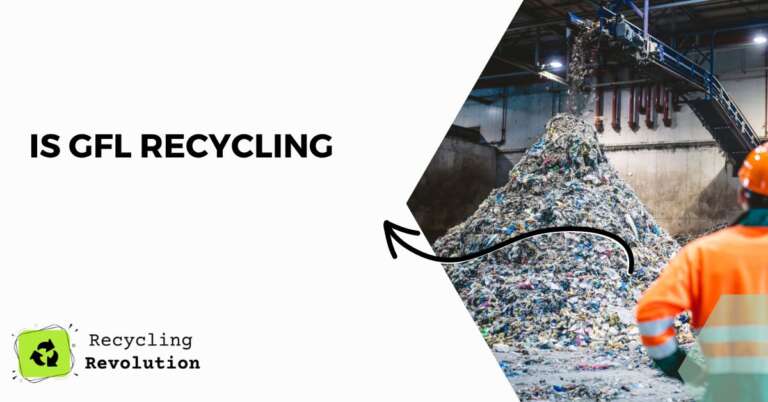If you’ve been wondering what the deal is when it comes to recycling GFL then you’re on the right track to getting the information you need. The straightforward answer is yes, GFL, which stands for Green For Life Environmental, is indeed involved in recycling.
GFL is a major North American player in the environmental services industry, providing a variety of services including waste management, recycling, and organics processing. But to truly understand what GFL is all about, we need to dive a bit deeper. Let’s get started!
TL;DR: GFL is a waste management company that also offers comprehensive recycling services. They’re known for their green and sustainable initiatives and operate in various regions throughout North America. GFL has made it a mission to offer environmentally-friendly solutions to both households and businesses.
GFL Environmental, with its trademark green trucks, is a company you’ve likely encountered if you’ve dealt with waste management or recycling in any capacity.
Founded in 2007 in Ontario, Canada, GFL has rapidly expanded throughout Canada and the United States, providing vital environmental services.
GFL’s Recycling Initiatives
GFL prides itself on being a leader in waste diversion, meaning they strive to reduce the amount of waste going to landfills by maximizing recycling and composting efforts.
I recommend understanding these initiatives not only because it’s beneficial for the environment but also because it might influence how you manage your waste. Here’s a rundown of some of their initiatives:
- Single Stream Recycling: This is a recycling system where all recyclables (like paper, plastic, glass, and metal) are mixed together in a collection truck, rather than being sorted by the depositor into separate commodities.
- Organics Recycling: GFL operates several facilities that compost food waste and yard waste, converting these materials into useful soil amendments.
- Construction & Demolition Debris Recycling: GFL offers services for recycling construction and demolition waste, a major source of waste in North America.
- E-Waste Recycling: GFL has solutions for e-waste or electronic waste, which is a growing concern due to the rapid pace of technology turnover.
Advantages of GFL Recycling
Green For Life (GFL) Recycling is making strides in a variety of sectors, demonstrating that recycling can be economically viable, environmentally responsible, and an essential part of modern society. Here’s how:
Comprehensive Services
GFL’s recycling efforts cater to everyone, from individual homeowners to large-scale industrial operations. They offer comprehensive services across residential, commercial, and industrial sectors, recycling millions of tons of waste annually.
This wide-reaching service ensures that a significant portion of waste material is diverted from landfills, leading to reduced harmful emissions and conservation of natural resources.
A Circular Economy
GFL’s unwavering commitment to sustainability is expressed through a two-pronged approach: minimizing landfill use and promoting a circular economy.
By focusing on reusing, refurbishing, and recycling, GFL has managed to reduce landfill waste by up to 50% or more in certain regions. The environmental benefits of this are vast, with decreased greenhouse gas emissions, less groundwater contamination, and a reduced need for new landfill space.
Boosting the Green Economy
But GFL’s efforts go beyond just environmental sustainability. Through its recycling initiatives, it has generated thousands of green jobs and contributed millions of dollars to the local economy.
This dual focus on economic and environmental benefits leads to a win-win scenario where natural resources are conserved, and energy consumption is reduced, while still stimulating economic growth.
Building a Culture of Recycling
Perhaps one of the most long-reaching impacts of GFL’s efforts is its commitment to education. Through various campaigns and partnerships, GFL reaches millions of people annually, educating them on the importance of recycling and proper waste management.
This education has translated into increased recycling rates in targeted areas, ensuring that more waste is properly sorted and recycled. The environmental impact of this education is profound, leading to further reductions in landfill use and harmful emissions.
How GFL Recycling Works
When it comes to how GFL handles recycling, the process is rather straightforward. I’ve broken it down into the following steps:
- Collection: Waste and recycling materials are collected from various sources such as homes, businesses, and construction sites.
- Sorting: The collected materials are then sorted. Recyclable materials are separated from non-recyclable waste.
- Processing: Once sorted, recyclable materials are processed into raw materials that can be used in the manufacturing of new products.
- Distribution: These raw materials are then sold to companies that use them to manufacture new products, promoting a circular economy.
GFL Recycling’s Innovation and Technology
While we’ve provided an overview of GFL Recycling, it’s worth delving deeper into the innovative technologies and forward-thinking practices this company deploys. GFL is a pioneer in utilizing technology to improve waste management and recycling processes.
Harnessing Advanced Sorting Technology
GFL makes use of advanced sorting technologies to process the vast amount of waste it collects. These technologies allow for precise sorting of recyclables, making it possible to maximize the amount of material that can be recovered and reused.
Automated sorting systems and infrared sorting technologies are among the tools GFL uses to separate different types of materials effectively.
Embracing the Circular Economy
GFL is a strong proponent of the circular economy model, which aims to keep resources in use for as long as possible, extracting the maximum value from them while in use, and then recovering and regenerating products and materials at the end of their service life.
By embracing this model, GFL helps ensure that the materials they collect are not only disposed of properly but also put back into productive use.
A Partner for Businesses
While residential recycling is an essential part of waste management, commercial and industrial recycling forms a significant chunk of GFL’s operations.
In fact, GFL works closely with businesses to design custom recycling programs that suit their specific needs. These programs help businesses reduce their environmental footprint and often comply with regulations and industry standards.
Custom Waste Diversion Solutions
GFL excels in providing waste diversion solutions tailored to the specific needs of each business. These can include everything from office recycling programs to large-scale industrial waste management and recycling.
Secure Document Destruction
For businesses that handle sensitive documents, GFL offers secure document destruction services. This service ensures that sensitive information is safely disposed of while still being recycled.
Going Beyond the Basics
While GFL Recycling is undoubtedly a leader in the recycling space, it’s essential to remember that the company’s services extend beyond recycling.
Hazardous Waste Management
GFL offers hazardous waste management services, helping businesses dispose of hazardous waste safely and in accordance with regulations.
This includes materials such as batteries, paints, solvents, and other potentially harmful substances.
Infrastructure Services
GFL also provides infrastructure services, including road maintenance, demolition, and excavation. These services help to build and maintain the communities in which GFL operates.
Note: As with any waste management and recycling service, it’s crucial to understand what materials can be collected and recycled in your specific region. Be sure to check with GFL or your local municipality to ensure you’re following guidelines correctly.
The Future of GFL Recycling
GFL has consistently shown a commitment to advancing its recycling capabilities and promoting sustainable practices. Their business model goes beyond traditional waste management to focus on resource recovery and waste diversion.
As for my personal insights, I recommend keeping an eye on GFL’s recycling initiatives. Not only do they have the potential to change how we approach waste management, but they also serve as a model for what all waste management companies should aspire to be.
Conclusion
Green For Life (GFL) Environmental does a big job helping us recycle things we use every day, like plastic bottles, paper, and even food scraps. They have big green trucks that pick up recycling from houses and businesses all over North America.
GFL makes sure that the stuff we throw away doesn’t just get buried in the ground but gets turned into something new again. This is super important because it keeps our planet cleaner and uses less from nature. So, remember, recycling with GFL means you’re doing your part to keep the Earth green and happy!
FAQ
Where does GFL operate?
GFL operates in all provinces of Canada and in 27 states in the U.S.
Does GFL offer residential recycling services?
Yes, GFL provides residential recycling services. Check with your local municipality for details.
What types of materials does GFL recycle?
GFL recycles a wide range of materials including paper, plastic, glass, metal, organics, construction debris, and e-waste.

